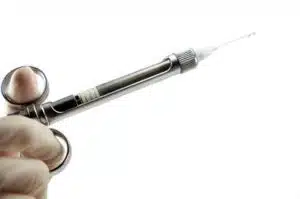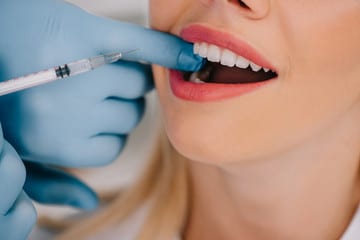Local anesthesia is defined as a loss of sensation in a specific area of your mouth without inducing a loss of consciousness. It requires topical application or needle injection if you need it during dental treatment.
Also, Local anesthesia can be defined as a localized state of insensibility to pain produced by preventing conjunction of stimuli along a nerve, by placing a chemical somewhere along its length.
Without Local anesthesia, your dentist cannot perform any dental surgery. Before any procedure start, your dentist has to insert it straight inside the gum of the area he or she is working on.
We have several local anesthetics that dentist use, which is, lidocaine (also called xylocaine or lignocaine), a modern replacement for procaine (also known as novocaine).
These drugs work very well and you may not experience any allergic reactions

What drugs are in Local anesthesia
The liquid in your glass injection contains:
The composition of Local anesthesia
- Local anaesthetic agent: Lignocaine Hydrochloride- 2%(20mg/ml)
- Reducing agent: Sodium meta-bisulphite-(0.5mg)
- Preservative: Methylparaben-0.1%(1mg)
- Diluting agent: Distilled water
- Fungicide: Thymol Isotonic
- solution: Sodium chloride or Ringer's Solution-6mg: helps the drugs get into your blood system
- Vasoconstrictor: These we decrease blood flow to the area and makes the numbness last longer.
- Sodium hydroxide: Nitrogen bubble-1-2mm in diameter and is present to prevent oxygen from being trapped in the cartridge and potentially destroying the Vasopressor
There are two varieties of numbing injections
- A block injection numbs we affect the entire area of your mouth where your dentist is working on, such as one side of your upper jaw.
- An infiltration injection numbs a smaller region. This is the region where the injection is giving.
In most cases, you may need Local anesthesia in order to have dental surgery treatment done. You may not feel pain, but you will feel the pressure as your dentist is inserting the Local anesthesia injection.
In addition, your injection may last for several hours after you leave the dentist office, and you may find it difficult to speak or eat. Relax and don't hurt yourself it wears off soon.
The side effect of Local anesthesia
Although the side effect of Local anesthesia, dental anesthesia is very rare but you may experience blood feel swelling hematoma after this procedure.
Some possible side effects of Local anesthesia may include,
- Eyelid or mouth drop
- Unable to blink your eyes
- heart beating fast
Within some hours all this side effect will stop, but if you think you are still experiencing more of it talk to your dentist. It may be as a result of injury to the nerve that makes you experiencing more side effects for days.
Your nerve we heal over time.

What are the uses of Topical Anaesthetics?
- Prevention of gingival discomfort while taking copper ring impressions.
- Reduction of the sensitivity of oral mucosa for patients who react during the taking of impression or radiographs.
- Prevention of pain from needles during injections
- Relief of painful sockets, ulcers, and wounds.
Complication of Local anesthesia
It is rare to have an allergic reaction or complication of Local anesthesia. Make sure you tell your dentist about all medicine you take including herbs and vitamins plus over the counter medications.
Complications in local anesthesia can be classified under local and systemic complications.
Local complications
- needle breakage
- Facial nerves paralysis
- trismus: prolonged tetanic spasm of the jaw muscles which may restrict normal opening of your mouth.
- Soft tissue injury
- hematoma
- pain on injection
- burning on injection
- sloughing of tissue
Systemic complication
- overdose reaction
- local toxic effects
- side effects
- toxicity caused by direct extension of the usual pharmacological effects of the drugs.
Conclusion
Be sure to tell your dentist if you are experiencing these complications and side effects. But in most cases, your numbness wear off without any complications.
This article is intended for education and general oral health topics. It is not a substitute for treatment. See your dentist for more information
References
- Anesthesia basics. (n.d.)
- kidshealth
- Becker, D. & Reed, K. L. (2006). Essentials of local anesthetic pharmacology. Anesthesia Progress 533, 98-109
The content is intended to augment, not replace, information provided by your clinician. It is not intended nor implied to be a substitute for professional medical advice. Reading this information does not create or replace a doctor-patient relationship or consultation. If required, please contact your doctor or other health care provider to assist you to interpret any of this information, or in applying the information to your individual needs.

